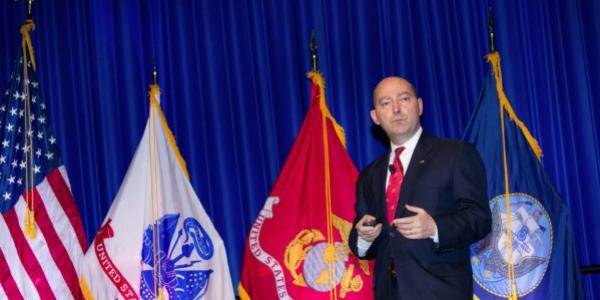The United States Is Not Ready for a Cyber Attack
The United States endures hundreds of millions of digital attacks every day, from cases of cyber terrorism by nation-states to identity and trade secret theft by digital criminals. The nation has been fending off an unprecedented range of digital threats, escalating both in intensity and sophistication. In spite of hardened networks protected by some of the most advanced programs, the U.S. government increasingly is a prime target.
The onslaught of cyberthreats has prompted at least one call for what would be tantamount to a sixth U.S. military service branch—a cyber force to own operations in the virtual domain. This has been the mantra of Adm. James Stavridis, USN (Ret.), former NATO commander and now dean of Tufts University’s Fletcher School of Law and Diplomacy, for several years. Next month, he and Adm. Michael Rogers, USN, commander of U.S. Cyber Command and director of the National Security Agency (NSA), are scheduled to deliver a keynote address at the West conference in San Diego. They will discuss the critical uncertainty facing U.S. military and government leaders in their session on Thursday, February 23, titled, “Are We Organized and Aligned to Fight the Cyber War?”
The answer for Adm. Stavridis can be summed up in four words: “We are not aligned.”
His assertion has been illustrated repeatedly in news report after news report of cyber breaches, including the hacking incidents of U.S. political institutions and individuals leading up to last year’s presidential election. Following the hacks, U.S. officials bluntly and publicly blamed the Russian government, citing the goal to influence the November U.S. general election as the prime motivator. “We believe, based on the scope and sensitivity of these efforts, that only Russia’s senior-most officials could have authorized these activities,” said a statement from Director of National Intelligence James R. Clapper and the Department of Homeland Security.
Successfully fighting the rising tide of cyber attacks requires a multipronged approach, says Adm. Stavridis, who shared some thoughts with SIGNAL before his February keynote address. This should include the creation of a national commission on cybersecurity similar to the 9/11 Commission assembled in the wake of the September 11, 2001, terrorist attacks. Appointing members to such a commission needs to come “before a cyber Pearl Harbor,” Adm. Stavridis says, referring to repeated warnings of an imminent debilitating cyber attack akin to the surprise Japanese attack on Pearl Harbor in World War II.
The admiral says he sees the need to separate the NSA from U.S. Cyber Command, putting different leaders at the helm of each. He also says there is merit in putting a single agency in charge of cybersecurity—essentially merging the cyber functions of the FBI, the NSA and the Department of Homeland Security. That same streamlining should occur within the military ranks as well, he suggests. Currently, each of the services runs its own cyber component, a construct that threatens “unity of command, fosters unhealthy competition among the services and inhibits the establishment of universal standards that transcend the [Defense Department’s] cyber community,” Adm. Stavridis wrote in 2014 in the U.S. Naval Institute’s magazine. “A stand-alone force would eliminate both the unity-of-command problem and the interservice rivalries and would prevent the inefficiencies associated with disparate personnel standards while allocating resources based on objectively adjudicated priorities.” He maintains those beliefs today.
During the keynote speech, Adm. Stavridis plans to call for the creation of a Cabinet-level officer to deal with cyber issues, much as the Office of the Director of National Intelligence was established after 9/11 to enact major intelligence reform.
For more information and for conference registration, visit www.westconference.org. West, co-sponsored by AFCEA International and the U.S. Naval Institute, is in its 27th year of bringing together military and industry leaders.





Comment
Cyber
I Feel that this cyber threats can be originating within the us within the digital infrastructer basing in companies such as general electric, honeywell, dish and an array of others with digital capabilities thus if we cant deal with our own cyber threats how can we have failsafes set in place for foreign ones
Comments